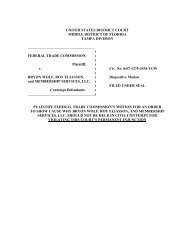Gasoline Price Changes - Federal Trade Commission
Gasoline Price Changes - Federal Trade Commission
Gasoline Price Changes - Federal Trade Commission
Create successful ePaper yourself
Turn your PDF publications into a flip-book with our unique Google optimized e-Paper software.
THE DYNAMIC OF SUPPLY, DEMAND, AND COMPETITION<br />
addition, as shown in Table 4-2, conventional gasoline and boutique fuels do not differ<br />
significantly in price variability in the Gulf Coast. In this case, neither pipeline limitations nor<br />
differences between conventional and boutique fuels alone appear to account for these results.<br />
Rather, the reason for the difference appears to lie in the fact that no regions along the<br />
Colonial and Plantation pipelines south of Virginia require the use of RFG. Any RFG in those<br />
pipelines is being shipped to Virginia or Maryland. If Virginia or Maryland experiences a supply<br />
shortage of RFG, the pipelines have no ability to divert supplies from other locations along the<br />
route into Virginia and Maryland. Instead, a shortage of RFG in Virginia or Maryland requires<br />
new shipments of RFG from the Gulf, which slows supply responses and thus increases price<br />
variability. For conventional gasoline, by contrast, the diversion of additional supplies to states<br />
along the pipelines experiencing supply shortages would be much faster and less costly and,<br />
accordingly, any effect from a supply shortage would be spread across a much broader area. The<br />
interaction between boutique fuel requirements and pipeline distribution limitations appears most<br />
significant in explaining these particular differences in standard deviations in Texas and<br />
Maryland for RFG retail-to-WTI margins.<br />
5. Conclusion.<br />
In sum, the analyses discussed above indicate that boutique fuel requirements do not, in<br />
and of themselves, cause greater gross product margin variability. For example, boutique fuel<br />
gross product margins in the Gulf are not significantly more variable than those for conventional<br />
gasoline. Nonetheless, boutique fuels may exacerbate the variability in areas, such as California,<br />
that are not interconnected with large refining centers.<br />
Interconnections via pipelines can reduce variability in gross product margins, but local<br />
refining capacity also appears to be important. The Gulf Coast, with its very large refining base,<br />
has less variable gross product margins than the East Coast, the Midwest, and the Rocky<br />
Mountain states. Pipeline interconnections will help reduce variability in an area. The<br />
effectiveness of pipelines in reducing gasoline price variability seems to be stronger when<br />
adjacent areas along the pipeline are using the same type of fuel, which may reduce the time it<br />
takes to reallocate supplies in case of a local supply disruption. For example, the variability of<br />
gross product margins for conventional gasoline, which is sold all along the Colonial and<br />
Plantation pipelines, is similar in the Gulf and in Maryland, but the variability of gross product<br />
margins for RFG, which is not sold between Texas and Maryland, appears to be higher in<br />
Maryland than in the Gulf.<br />
Endnotes<br />
1. The Clean Air Act, as amended in 1990, 42 U.S.C. §§ 7401-7626, mandated the establishment of reformulated<br />
gasoline requirements for “non-attainment areas” that had not met federal goals for air quality. See FED. TRADE<br />
COMM’N (FTC), MIDWEST GASOLINE PRICE INVESTIGATION 4 (final report, 2001) [hereinafter MIDWEST<br />
CHAPTER 4: THE REGIONAL LEVEL 97
















